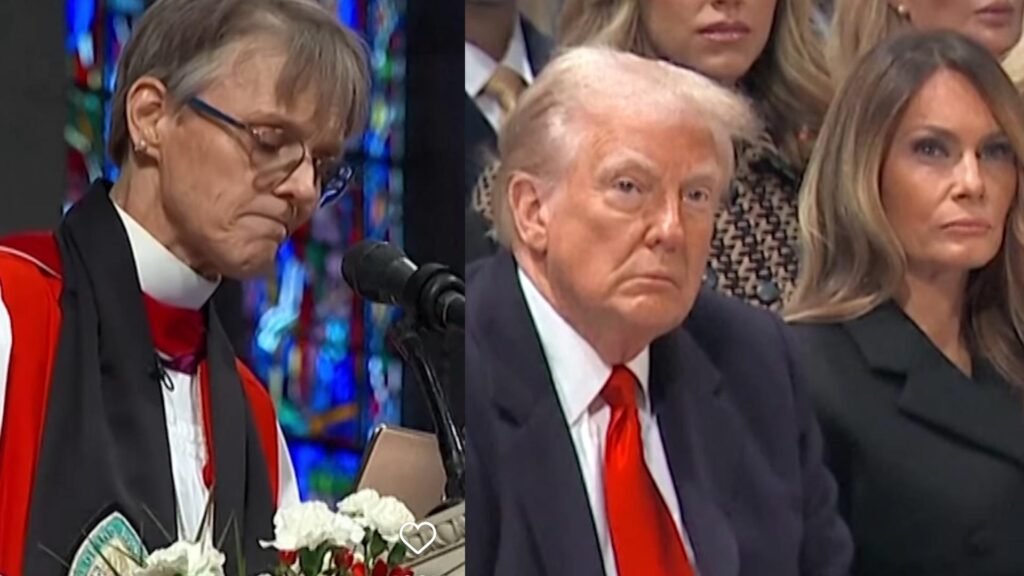At the inaugural prayer service for President Trump, Bishop Budde called for compassion and highlighted the importance of LGBTQ+ representation, emphasising the need for inclusivity in faith and society.
Bishop Mariann Edgar Budde: A Brave Advocate for Human Rights and LGBTQ+ Representation
On a significant day in Washington, DC, the inaugural prayer service for President Donald Trump emerged as a critical moment at the intersection of faith, politics, and social issues. Hosted at the historic Washington National Cathedral, the service was marked by solemnity, reflection, and urgent calls for inclusivity.
At the forefront of this discourse was Bishop Mariann Edgar Budde, the leader of the Episcopal Diocese of Washington. Her poignant prayer during the service was not merely a formality; it encapsulated a powerful yearning for mercy and compassion within leadership. By urging President Trump to embody these virtues, Bishop Budde articulated a vision for healing and unity in a time marked by political divisiveness.
In a strikingly brave move, Bishop Budde seized the moment to advocate for the rights of LGBTQ individuals—an essential topic amidst growing concerns regarding the potential ramifications of political policies on the most vulnerable communities. This stance resonated deeply, especially against the backdrop of an LGBTQ+ community that’s still grappling with representation and recognition.
A Call for Inclusivity
Bishop Budde’s remarks were not an isolated incident; they echo a broader narrative that inclusivity and justice are fundamental to both faith and societal harmony. Her commitment to protecting the dignity and rights of all, particularly LGBTQ+ individuals, is significant. In the UK, the landscape of media representation provides a pertinent context for her advocacy. While 36% of LGBT+ people in the UK believe that lesbian, gay, and bisexual individuals are positively portrayed in the media, a staggering 53% feel that transgender and non-binary individuals are shown negatively. This sentiment underscores the stark reality of representation that is still disconnected from the authentic experiences of many.
The importance of such advocacy within religious and public spheres cannot be overstated. Faith leaders like Bishop Budde are crucial in promoting messages of compassion and acceptance. Just as her words inspired many in Washington, the importance of having strong allies in the UK’s faith communities who speak out for LGBTQ+ rights is equally vital.
The Impact of Representation
Bishop Budde’s advocacy aligns seamlessly with ongoing discussions about the need for positive representation in media, especially for young LGBTQ+ individuals. Research highlights that seeing authentic portrayals of oneself in media can validate experiences and foster self-worth – critical components for youth grappling with their identities. Significantly, young LGBTQ+ Britons often report the importance of knowing queer public figures, reinforcing a sense of belonging and confidence as they navigate societal challenges.
While shows like “Heartstopper” and “Schitt’s Creek” have made strides in offering nuanced portrayals of LGBTQ+ relationships, the persistent need for authentic storytelling, particularly for marginalised groups like Black queer individuals, remains a pressing concern. Despite some progress, many stories continue to be sidelined or reduced to stereotypes.
In parallel, Bishop Budde’s advocacy serves as a beacon of hope, demonstrating that the church and faith can stand as allies for justice and inclusivity.
A Message of Hope and Courage
As the nation watched and listened, the inaugural prayer service transformed into a pivotal dialogue on the responsibilities of leadership in a diverse society. Bishop Budde’s call for compassion was a reminder that the fight for equality and human rights extends far beyond the walls of the cathedral and into the very fabric of society.
Her bravery in speaking the truth and standing up for human rights is commendable, especially during a time when such actions are vital. With leaders like Bishop Budde advocating for all, including the historically marginalized LGBTQ+ community, there is hope that compassion, respect, and justice can become the cornerstones of our societal interactions—both in the United States and the United Kingdom.
In this moment of reflection and action, it becomes clear that the role of allies—whether in faith, politics, or media—cannot be understated. Bishop Budde’s invaluable contributions serve as an inspiration not only for those within her community but for anyone dedicated to the pursuit of a more inclusive and empathetic world.





